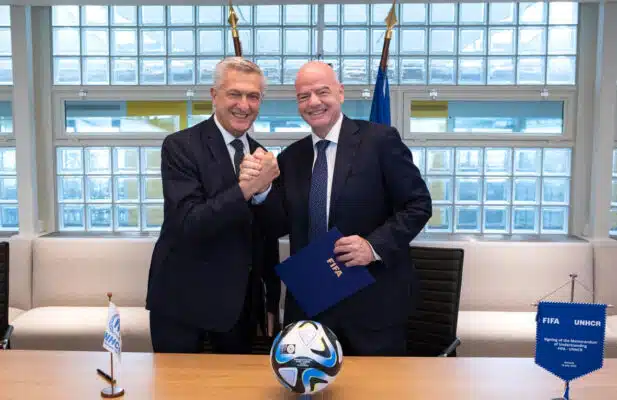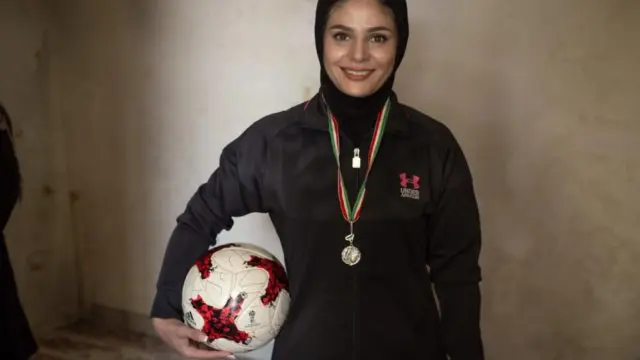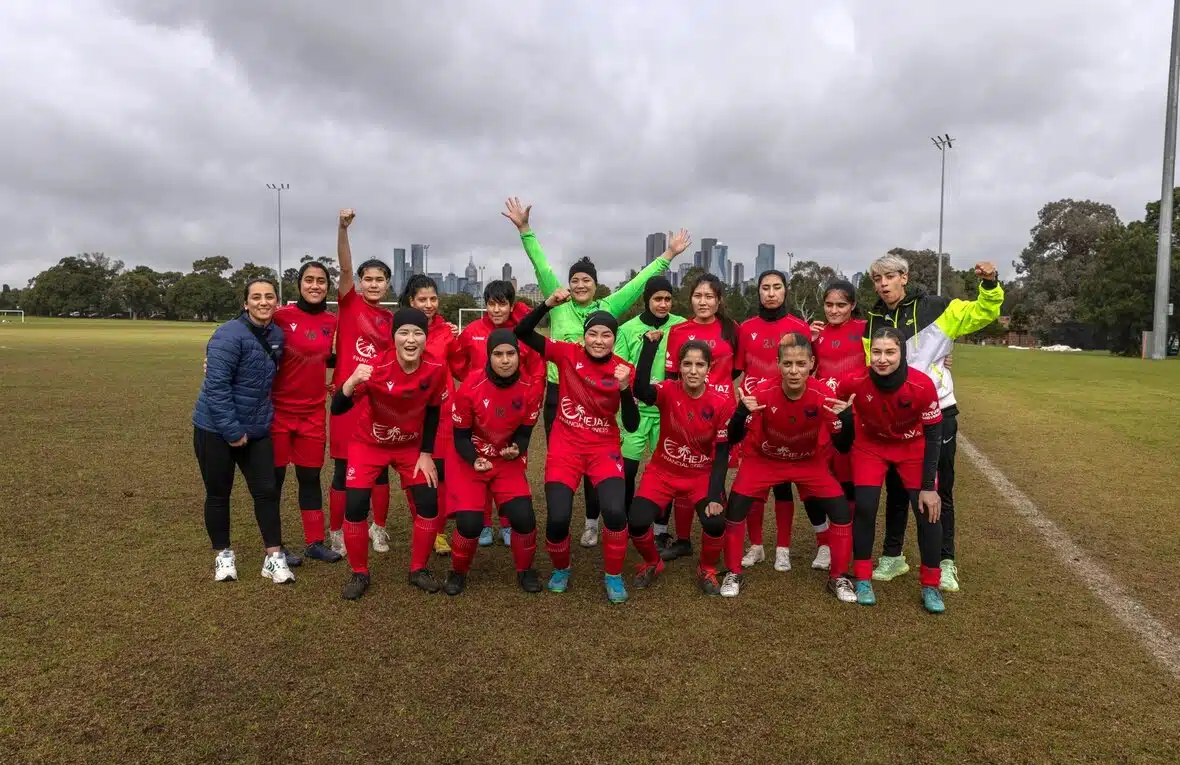
The Afghan Women’s National Football Team gather for a match at Princess Park in Melbourne. © UNHCR/Heidi Wentworth-Ping
Team members have found safety and “a second chance” in Melbourne while using every opportunity to advocate for the rights of women back home
By Charlotta Lomas in Melbourne, Australia
When Fatima Yousufi was a child, she loved nothing more than to watch football on TV with her younger brother. Never did she imagine that one day, she would become the goalkeeper and captain of the Afghan Women’s National Football Team.
She remembers vividly the first time she played football.
“I was in the schoolground, playing with some other girls. It was amazing. I felt like Messi or Ronaldo. I was proud that I was doing a sport which is only for boys in my country. I felt so powerful.”
Not long after, a scout spotted her playing and invited her to train with Afghanistan’s under 17s team. A year later, at the age of 16, Fatima joined the national women’s football team and quickly became a high-profile athlete in her country.
“My life wasn’t very big, but when I joined the [team], it changed to a very wide world. Sport changed my life.”
A painful separation
Her life changed again when the de facto authorities came to power in August 2021. Suddenly, it was not safe for her to show her face in public, let alone play football.
The 19-year-old Hazara woman buried her jerseys and trophies in the backyard and fled to the airport with her family. After an international effort, the Australian government had granted emergency visas to evacuate Fatima and 37 other women players, as well as their family members, to Australia. But in the chaos at Kabul Airport, Fatima’s parents and her youngest sister were pushed back and did not make it onto the plane with Fatima and her brother.
“Everybody was terrified and trying to escape. Everybody was running. I didn’t have the chance to say goodbye to my mum and dad, and the last time I saw them was at the airport,” she says, adding that her parents and sister eventually made it out of the country to Pakistan while she reunited with two other siblings in Dubai before they flew together to Sydney.
Since 2021, 1.6 million people have fled Afghanistan, mainly to neighbouring countries. Another 3.2 million remain internally displaced inside the country.
Like most of the team, Fatima and her siblings settled in Melbourne where she has been studying English and trying to adapt to a new culture while coming to terms with being separated from her parents and youngest sister who she has not seen for nearly two years.
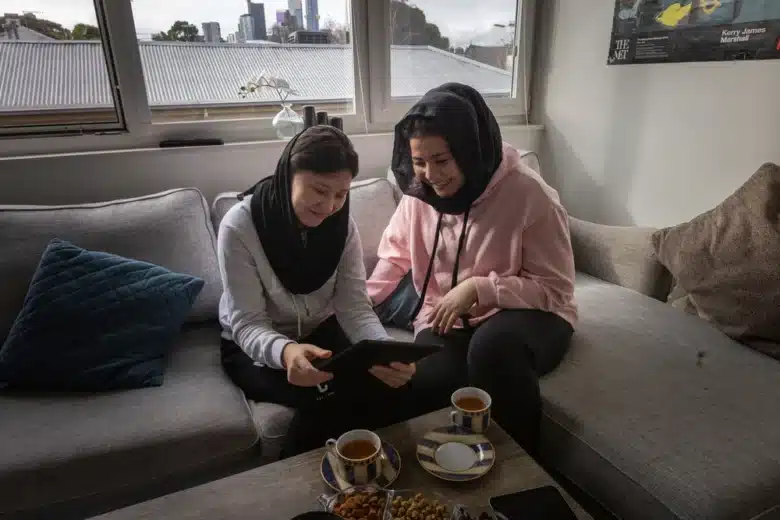
Fatima (right) with her sister, Bibi, in their Melbourne home. © UNHCR/Heidi Wentworth-Ping
More than just a game
“It was quite strange to imagine myself here because I never had the idea about living in Australia,” she says.
She now has a part-time job as an IT assistant which allows her to send money to her family. She hopes that one day soon they can be reunited. In the meantime, football has helped distract her from the pain of separation. For her, it’s more than just a game.
“Playing soccer is magical for me. It’s like a medicine that heals wounds of war and personal trauma. Especially when I’m on the field, I feel safe. I’m trying to forget all those scenes and all the things I’ve been through.”
Through their shared hardships, she has also formed an unbreakable bond with her teammates.
“In soccer, you’re playing in a team, you have a second family. My sadness is theirs and their sadness is mine; the same with happiness,” she says.
A symbol for women’s rights
The Afghan Women’s Football Team is being sponsored by the Australian professional football club Melbourne Victory and competes in the state league. The women have been kicking goals both on and off the football field. They take every opportunity to speak publicly and advocate for the rights of women back home who have been banned from playing sports and barred from many areas of public life.
“They’ve become a symbol of women’s and girls’ rights in Afghanistan and all around the world and a very important group within Australian society,” says Craig Foster, refugee advocate and former captain of the Australian men’s national football team, who helped bring the team to Australia.
He added that they are also “helping to reshape the narrative around refugees in Australia.”
While her journey has not been easy, Fatima is grateful for the safety, and freedom to be herself which she has found in Australia: “I have a second chance to be alive, to go for my education, to do my sport.”
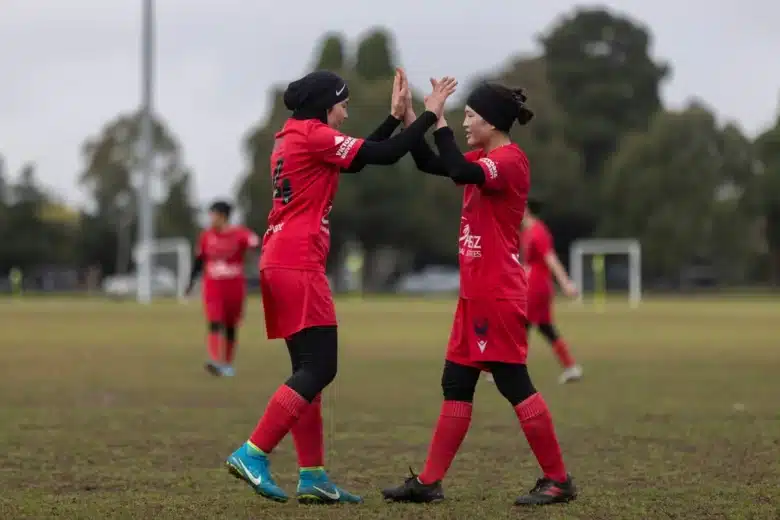
Members of the team celebrate after winning their match in Princess Park. © UNHCR/Heidi Wentworth-Ping
The UN High Commissioner for Refugees Filippo Grandi met the team in Australia during a visit in April.
“I was so inspired to meet them and witness the transformative power of sport for people displaced by war and conflict, and as a critical means of inclusion,” he said. “They are courageous women taking a chance to win inside and outside the football field and an inspiration to other refugees and all of us.”
Despite no longer being recognized as a national team by the de facto authorities in Afghanistan, the women are working hard on making a future in sport in their new country. Fatima will soon begin a degree in sports management which she hopes to use to support women with ambitions similar to her own.
With the FIFA Women’s World Cup taking place in Australia and New Zealand, women’s football is back in the international spotlight. The Afghan Women’s Football team may not be taking part in the tournament, but Fatima will be watching closely and rooting for her adopted country’s team.
“I definitely want the Matildas to win,” she says.
Originally published by UNHCR on 25 July 2023.



